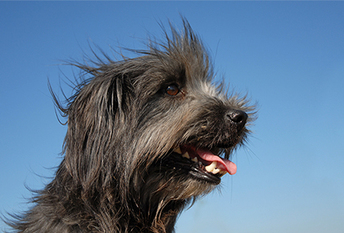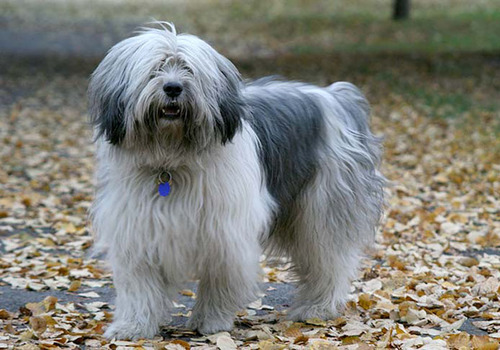The Polish Lowland Sheepdog has a long, thick, shaggy double coat. It has a crisp texture and is meant to be water-resistant.
Expect to spend an hour per week or some time daily keeping it groomed. Brush it with a natural bristle brush and then comb it out, making sure you get all the way down to the skin. If you let the coat go, it will become matted and may need to be trimmed short. It will take the coat nine to 12 months to grow back. A monthly bath doesn’t come amiss. On the plus side, PONs don’t shed much.
The rest is basic care. Trim the nails as needed, usually every week or two. Keep the ears clean and dry, and brush the teeth frequently with a vet-approved pet toothpaste for overall good health and fresh breath. Grooming a puppy takes very little time at all, but you want to start early so he can become accustomed to sitting still while you work on his coat.
PONs are a working breed and require at least an hour of daily exercise. When not provided with sufficient physical exercise and mental stimulation, they can often turn moody and destructive.
PONs bond closely with their owners and love to accompany them on long walks or hikes, or working with their human partner in canine events such asobedience,herding,agilitytrials, or dock diving. They are often at their happiest when they have a ‘meaningful’ task to work at each day.
PONs require a low protein diet and should be fed controlled servings as they often tend to over-eat.
They should do well on high-quality dog food, whether commercially manufactured or home-prepared with your veterinarian’s supervision and approval. Any diet should be appropriate to the dog’s age (puppy, adult, or senior).
Treatscan be an important aid in training, but giving too many can cause obesity. Learn about whichhuman foodsare safe for dogs, and which are not. Check with your vet if you have any concerns about your dog’s weight or diet.Clean, fresh water should be available at all times.
Polish Lowland Sheepdogs are generally healthy, andresponsible breeders test their stock for health concerns such as hip dysplasiaand communicate with other dedicated breeders regularly, working together for the health of the breed and preservation of its unique qualities. Regular visits to the vet for checkups and parasite control help to ensure the dog has a long, healthy life.
PONs are excellent house dogs: accepting of other animals, gentle and tireless playmates for kids, alert watchdogs, and quick learners. The breed can also be dominating, stubborn, and suspicious of strangers, earlysocializationandpuppy training classesare highly recommended. PONs are affectionate, bouncy, trainable pets for owners who can handle a confident, territorial herding dog.











